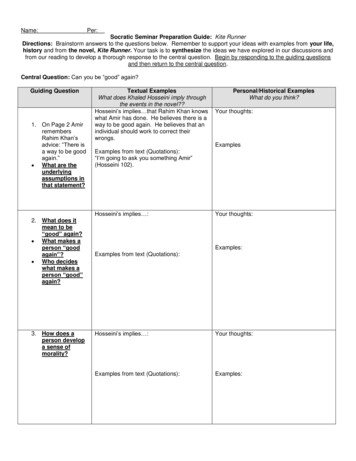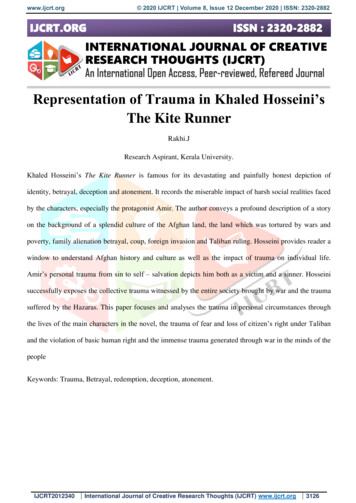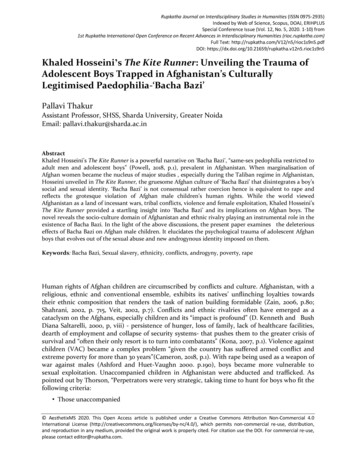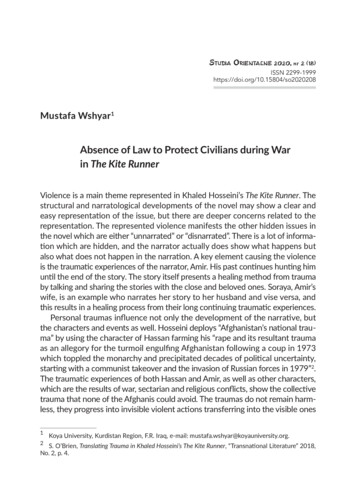
Transcription
The kite runner online book pdf
Is the kite runner on netflix. The kite runner book near me. What does the kite runner symbolize. Listen to the kite runner book online free. The kite runner short summary. The kite runner full book online free. What is the main message of the kite runner.Set in the early 1970’s in Kabul. This is the heart-breaking story of an unlikely friendship between a wealthy boy, and the son of his father’s servant. A beautifully written and tear-jerking book set in a country that is in the process of being destroyed. More about the Author Amir is a young boy who likes running kites with Hassan, the son of hisfather’s servant. But neither of the boys can foresee what is soon to happen, an event that will change their lives forever. Told against the devastating backdrop of the recent history of Afghanistan, The Kite Runner is a tale of family, love, friendship and the healing power of redemption. Khaled Hosseini Khaled Hosseini King Zahir Kite Running WatchFerozkoh Kite Festival Watch Reading The Kite Runner Khaled Hosseini Watch Reading The Kite Runner Turquoise Mountain Watch Recommended by: Khaled Hosseini One of the literary masterpieces of modern literature, Moby-Dick is a tale of obsession, revenge, and the epic struggle between man and nature. As Ishmael boards the Pequod, he isunaware of the journey he is about to embark on, a by Herman Melville Recommended by: Khaled Hosseini This collection of stories by Nobel Prize winner Alice Munro captures the essence of life through a series of chance encounters and twists of fate that beautifully illustrates how unordinary ordinary life can be. by Alice Munro Recommendedby: Khaled Hosseini Daniele Mallarico and his four-year-old grandson Mario find themselves having to spent 72 hours together in Daniele’s apartment in Naples. Against the backdrop of a city bursting with life but also violent, grandfather and grandson will engage in a battle by Domenico Starnone Inspired by Shakespeare’s most famous play,Hamnet is the story of a boy whose life has been forgotten, but whose name has echoed throughout the centuries as one of the greatest plays ever written. Reimagining the life of Hamnet Shakespeare, by Maggie O’Farrell Maryam is only a young girl when she is abducted by the Jihadis, finding herself married into Boko Haram. Inspired by theChibok schoolgirls kidnapping, her story is that of many girls, abruptly stripped of their innocence and forced to by Edna O’Brien Recommended by: Delia Owens Inspired by the story of Margaret Garner, the novel is set in the aftermath of the American Civil War and follows Sethe, a formerly enslaved woman, and her family as they live in a househaunted by what they believe by Toni Morrison Recommended by: Philip Pullman Set against the backdrop of António Salazar’s dictatorship, the book follows Pereira, a journalist struggling to come to terms with the rise of fascism, the death of his wife, and the child they never had. A chance encounter with a by Antonio Tabucchi Recommendedby: Edna O’Brien Drawing from Conrad’s own experience in the Congo, this powerful and enigmatic novella tells the story of Charlie Marlow, captain of a river steamer setting out for the heart of the African continent in search of the mysterious Kurtz, an by Joseph Conrad The unforgettable, heartbreaking story of the unlikely friendship between awealthy boy and the son of his father's servant, The Kite Runner is a beautifully crafted novel set in a country that is in the process of being destroyed. It is about the power of reading, the price of betrayal, and the possibility of redemption, and it is also about the power of fathers over sons—their love, their sacrifices, their lies.The first Afghan novelto be written in English, The Kite Runner tells a sweeping story of family, love, and friendship against a backdrop of history that has not been told in fiction before, bringing to mind the large canvases of the Russian writers of the nineteenth century. But just as it is old-fashioned in its narration, it is contemporary in its subject-the devastating historyof Afghanistan over the last thirty years. As emotionally gripping as it is tender, The Kite Runner is an unusual and powerful debut. The #1 New York Times bestselling novel beloved by millions of readers the world over.“A vivid and engaging story that reminds us how long his people [of Afghanistan] have been struggling to triumph over the forces ofviolence—forces that continue to threaten them even today." –New York Times Book Review The unforgettable, heartbreaking story of the unlikely friendship between a wealthy boy and the son of his father’s servant, caught in the tragic sweep of history, The Kite Runner transports readers to Afghanistan at a tense and crucial moment of change anddestruction. A powerful story of friendship, it is also about the power of reading, the price of betrayal, and the possibility of redemption; and an exploration of the power of fathers over sons—their love, their sacrifices, their lies. Since its publication in 2003 Kite Runner has become a beloved, one-of-a-kind classic of contemporary literature, touchingmillions of readers, and launching the career of one of America's most treasured writers. The #1 New York Times bestselling debut novel that introduced Khaled Hosseini to millions of readers the world over. The unforgettable, heartbreaking story of the unlikely friendship between a wealthy boy and the son of his father’s servant, caught in thetragic sweep of history, The Kite Runner transports readers to Afghanistan at a tense and crucial moment of change and destruction. A powerful story of friendship, it is also about the power of reading, the price of betrayal, and the possibility of redemption; and an exploration of the power of fathers over sons—their love, their sacrifices, their lies.Since its publication in 2003 Kite Runner has become a beloved, one-of-a-kind classic of contemporary literature, touching millions of readers, and launching the career of one of America's most treasured writers. A lot of the drama books and novels are there in the market available for you to read and enjoy, but some of them are simply irresistibleones, just like the one we are talking about. We assure you that you are going to love this book for sure. Not only a fiction book but this one is going to make the history alive in front of your eyes as well. Yes, the book we are talking about i.e The Kite Runner is one of the most interesting and insanely realistic historical fiction books as well. It is one ofthe very fewer books across all around the globe as well. Which makes it more and more interesting and easy to read as well. Talking about the main story and the main theme of the book, the book tells us about a young boy known as Amir. And he is living in the Wazir Akbar District in the Kabul Afghanistan. He is having a very close friend as well.And the name of the friend is Hassan. The time this book is going to tell us about is the time of the fall of Afghanistan’s monarchy through the Soviet military intervention. If you are interested in the movies then go ahead and watch the movie based on the same story. About Author Khaled Hosseini: The writer of “The Kite Runner” is an Afghan-bornAmerican novelist. Khaled Hosseini is not only a very good novelist but a very good physician as well. He is also the winner of many of the big awards as well. Features of The Kite Runner pdf: English is the original language of the book. The original publication date of the book is 29th May 2003. The United States is the original publication place ofthe book. There are 372 pages of the book. Download The Kite Runner PDF: Click the button below to download The Kite Runner PDF and read online. Top reviews Most recent Top reviews Top reviews from India Top reviews from other countries Praise for The Kite Runner: 'My top fiction book . . . marvellous' Joanna Trollope, Books of the Year,Observer 'Unforgettable . extraordinary . It is so powerful that for a long time after, everything I read seemed bland' Isabel Allende 'A gripping read and a haunting story of love, loss and betrayal. Guaranteed to move even the hardest heart' Independent 'Shattering . devastating and inspiring' Observer 'The Kite Runner is told with simplicity andpoise, it is a novel of great hidden intricacy and wisdom, like a timeless Eastern tale. It speaks the most harrowing truth about the power of evil, personal and political, and intoxicates, like a high-flying kite, with the power of hope' Daily Telegraph 'Stunning and heartbreaking in its quiet intensity . Hosseini's writing is meticulous and evocative'Guardian 'A marvellous first novel . . . It's an old-fashioned kind of novel that really sweeps you away' San Francisco Chronicle 'From the first lines of The Kite Runner, Khaled Hosseini shows how an engaging novel begins - with simple, exquisite writing that compels the reader to turn the page. But Hosseini's novel is more than just good writing, it isalso a wonderfully conjured story that offers a glimpse into an Afghanistan most Americans have never seen and depicts a side of humanity rarely revealed . for the reader, the ride is exhilarating' Star Tribune 'The Kite Runnerr is powerful and involving' Time Out 'Stunning . . . It is rare that a book is at once so timely and of such high literary quality'Publishers Weekly 'Here is a real find: a striking debut . . . a passionate story of betrayal and redemption . . . a searing spectacle of hard-won personal salvation. All this, and a rich slice of Afghan culture too: irresistible' Kirkus Reviews 'What's most conspicuous on almost every page of this debut is not language, but the shimmer of life. There is nodisplay in Hosseini's writing, only expression - a lesson for all budding novelists . . . Hosseini does tenderness and terror, California dream and Kabul nightmare with equal aplomb . . . A carefully built structure of ripping yarn and ethical parable' Globe and Mail, Canada 'Not only manages to enthrall the reader with its narrative but also gives aninsight into a culture and mindset way beyond our own experience' Dublin Evening Herald 'A marvellous read, full of the exoticism of a strange land . . . beautifully written, in a limpid prose that, like all good writing, looks so simple on the page. This is one that I will reread, maybe more than once' Irish Examiner 'Balances socio-political commentarywith an emotionally powerful narrative' Ink 'It's a Shakespearean beginning to an epic tale that spans lives lived across two continents amid political upheavals, where dreams wilt before they bud and where a search for a child finally makes a coward into a man . . . rich and soul-searching . . . His world is a patchwork of the beautiful and the horrific,and the book a sharp, unforgettable taste of the trauma and tumult experienced by Afghanis as their country buckled' Observer 'A beautiful novel . . . it ranks among the best-written and most provocative stories of the year . . . The Kite Runner is a song in a new key. Hosseini is an exhilaratingly original writer with a gift for irony and a gentle,perceptive heart. His canvas might be a place and time Americans are only beginning to understand, but he paints his art on the page, where it is intimate and poignant' Denver Post 'His description of Amir's relationship with Hassan is beautifully nuanced, and the moment of Amir's ultimate betrayal is genuinely shocking. It is a passionate story'Literary Review 'Hosseini's stunning debut is a gripping tale of love and loss, exile and homeland' Big Issue 'If you liked The God of Small Things, then you'll love The Kite Runner . it is fable-like and deals in picturesque absolutes . . . compelling' Image 'Combines the tones of memory and nostalgia with a desire to recreate a lost world . . . The KiteRunner is reminiscent of those classic European novellas of innocence bruised by experience' Independent 'Told in a cool, detached voice that provides a counterpoint to the growing sense of tension which is frequently stretched to breaking point as the story unfolds' Times Literary Supplement BY THE SAME AUTHOR A Thousand Splendid Suns THEKITE RUNNER Khaled Hosseini BLOOMSBURY First published in Great Britain 2003 Copyright (c) 2003 by Khaled Hosseini This electronic edition published 2009 by Bloomsbury Publishing Plc The right of Khaled Hosseini to be identified as the author of this work has been asserted by her in accordance with the Copyright, Designs and Patents Act1988 All rights reserved. You may not copy, distribute, transmit, reproduce or otherwise make available this publication (or any part of it) in any form, or by any means (including without limitation electronic, digital, optical, mechanical, photocopying, printing, recording or otherwise), without the prior written permission of the publisher. Any personwho does any unauthorised act in relation to this publication may be liable to criminal prosecution and civil claims for damages. Bloomsbury Publishing Plc, 36 Soho Square, London W1D 3QY A CIP catalogue record for this book is available from the British Library ISBN 978-1-40880372-1 www.bloomsbury.com/khaledhosseini Visitwww.bloomsbury.com to find out more about our authors and their books. ou will find extracts, authors interviews, author events and you can sign up for newsletters to be the first to hear about our latest releases and special offers. Contents Acknowledgments CHAPTER ONE CHAPTER TWO CHAPTER THREE CHAPTER FOUR CHAPTER FIVECHAPTER SIX CHAPTER SEVEN CHAPTER EIGHT CHAPTER NINE CHAPTER TEN CHAPTER ELEVEN CHAPTER TWELVE CHAPTER THIRTEEN CHAPTER FOURTEEN CHAPTER FIFTEEN CHAPTER SIXTEEN CHAPTER SEVENTEEN CHAPTER EIGHTEEN CHAPTER NINETEEN CHAPTER TWENTY CHAPTER TWENTY-ONE CHAPTER TWENTYTWO CHAPTER TWENTY-THREE CHAPTER TWENTY-FOUR CHAPTER TWENTY-FIVE A NOTE ON THE AUTHOR Khaled Hosseini was born in Kabul, Afghanistan and moved to the United States in 1980. His first novel, The Kite Runner , was an international best seller, published in thirty-four countries. His second novel, A Thousand Splendid Suns ,was a number one bestseller and was published in May 2007. In 2006 he was named a goodwill envoy to the United Nations Refugee Agency. He lives in northern California. This book is dedicated to Haris and Farah, both the noor of my eyes, and to the children of Afghanistan. Acknowledgments I am indebted to the following colleagues for theiradvice, assistance, or support: Dr. Alfred Lerner, Dori Vakis, Robin Heck, Dr. Todd Dray, Dr. Robert Tull, and Dr. Sandy Chun. Thanks also to Lynette Parker of East San Jose Community Law Center for her advice about adoption procedures, and to Mr. Daoud Wahab for sharing his experiences in Afghanistan with me. I am grateful to my dear friendTamim Ansary for his guidance and support and to the gang at the San Francisco Writers Workshop for their feedback and encouragement. I want to thank my father, my oldest friend and the inspiration for all that is noble in Baba; my mother who prayed for me and did nazr at every stage of this book's writing; my aunt for buying me books when Iwas young. Thanks go out to Ali, Sandy, Daoud, Walid, Raya, Shalla, Zahra, Rob, and Kader for reading my stories. I want to thank Dr. and Mrs. Kayoumy--my other parents--for their warmth and unwavering support. I must thank my agent and friend, Elaine Koster, for her wisdom, patience, and gracious ways, as well as Cindy Spiegel, my keen-eyedand judicious editor who helped me unlock so many doors in this tale. And I would like to thank Susan Petersen Kennedy for taking a chance on this book and the hardworking staff at Riverhead for laboring over it. Last, I don't know how to thank my lovely wife, Roya--to whose opinion I am addicted--for her kindness and grace, and for reading,rereading, and helping me edit every single draft of this novel. For your patience and understanding, I will always love you, Roya jan. ONE December 2001 I became what I am today at the age of twelve, on a frigid overcast day in the winter of 1975. I remember the precise moment, crouching behind a crumbling mud wall, peeking into the alley nearthe frozen creek. That was a long time ago, but it's wrong what they say about the past, I've learned, about how you can bury it. Because the past claws its way out. Looking back now, I realize I have been peeking into that deserted alley for the last twenty-six years. One day last summer, my friend Rahim Khan called from Pakistan. He asked me tocome see him. Standing in the kitchen with the receiver to my ear, I knew it wasn't just Rahim Khan on the line. It was my past of unatoned sins. After I hung up, I went for a walk along Spreckels Lake on the northern edge of Golden Gate Park. The early-afternoon sun sparkled on the water where dozens of miniature boats sailed, propelled by a crispbreeze. Then I glanced up and saw a pair of kites, red with long blue tails, soaring in the sky. They danced high above the trees on the west end of the park, over the windmills, floating side by side like a pair of eyes looking down on San Francisco, the city I now call home. And suddenly Hassan's voice whispered in my head: For you, a thousand timesover. Hassan the harelipped kite runner. I sat on a park bench near a willow tree. I thought about something Rahim Khan said just before he hung up, almost as an afterthought. There is a way to be good again. I looked up at those twin kites. I thought about Hassan. Thought about Baba. Ali. Kabul. I thought of the life I had lived until the winter of1975 came along and changed everything. And made me what I am today. TWO When we were children, Hassan and I used to climb the poplar trees in the driveway of my father's house and annoy our neighbors by reflecting sunlight into their homes with a shard of mirror. We would sit across from each other on a pair of high branches, our nakedfeet dangling, our trouser pockets filled with dried mulberries and walnuts. We took turns with the mirror as we ate mulberries, pelted each other with them, giggling, laughing. I can still see Hassan up on that tree, sunlight flickering through the leaves on his almost perfectly round face, a face like a Chinese doll chiseled from hardwood: his flat,broad nose and slanting, narrow eyes like bamboo leaves, eyes that looked, depending on the light, gold, green, even sapphire. I can still see his tiny low-set ears and that pointed stub of a chin, a meaty appendage that looked like it was added as a mere afterthought. And the cleft lip, just left of midline, where the Chinese doll maker's instrument mayhave slipped, or perhaps he had simply grown tired and careless. Sometimes, up in those trees, I talked Hassan into firing walnuts with his slingshot at the neighbor's one-eyed German shepherd. Hassan never wanted to, but if I asked, really asked, he wouldn't deny me. Hassan never denied me anything. And he was deadly with his slingshot.Hassan's father, Ali, used to catch us and get mad, or as mad as someone as gentle as Ali could ever get. He would wag his finger and wave us down from the tree. He would take the mirror and tell us what his mother had told him, that the devil shone mirrors too, shone them to distract Muslims during prayer. "And he laughs while he does it," healways added, scowling at his son. "Yes, Father," Hassan would mumble, looking down at his feet. But he never told on me. Never told that the mirror, like shooting walnuts at the neighbor's dog, was always my idea. The poplar trees lined the redbrick driveway, which led to a pair of wrought-iron gates. They in turn opened into an extension of thedriveway into my father's estate. The house sat on the left side of the brick path, the backyard at the end of it. Everyone agreed that my father, my Baba, had built the most beautiful house in the Wazir Akbar Khan district, a new and affluent neighborhood in the northern part of Kabul. Some thought it was the prettiest house in all of Kabul. A broadentryway flanked by rosebushes led to the sprawling house of marble floors and wide windows. Intricate mosaic tiles, handpicked by Baba in Isfahan, covered the floors of the four bathrooms. Gold-stitched tapestries, which Baba had bought in Calcutta, lined the walls; a crystal chandelier hung from the vaulted ceiling. Upstairs was my bedroom,Baba's room, and his study, also known as "the smoking room," which perpetually smelled of tobacco and cinnamon. Baba and his friends reclined on black leather chairs there after Ali had served dinner. They stuffed their pipes--except Baba always called it "fattening the pipe"--and discussed their favorite three topics: politics, business, soccer.Sometimes I asked Baba if I could sit with them, but Baba would stand in the doorway. "Go on, now," he'd say. "This is grown-ups' time. Why don't you go read one of those books of yours?" He'd close the door, leave me to wonder why it was always grown-ups' time with him. I'd sit by the door, knees drawn to my chest. Sometimes I sat there for anhour, sometimes two, listening to their laughter, their chatter. The living room downstairs had a curved wall with custom-built cabinets. Inside sat framed family pictures: an old, grainy photo of my grandfather and King Nadir Shah taken in 1931, two years before the king's assassination; they are standing over a dead deer, dressed in knee-high boots,rifles slung over their shoulders. There was a picture of my parents' wedding night, Baba dashing in his black suit and my mother a smiling young princess in white. Here was Baba and his best friend and business partner, Rahim Khan, standing outside our house, neither one smiling--I am a baby in that photograph and Baba is holding me, lookingtired and grim. I'm in his arms, but it's Rahim Khan's pinky my fingers are curled around. The curved wall led into the dining room, at the center of which was a mahogany table that could easily sit thirty guests--and, given my father's taste for extravagant parties, it did just that almost every week. On the other end of the dining room was a tall marblefireplace, always lit by the orange glow of a fire in the wintertime. A large sliding glass door opened into a semicircular terrace that overlooked two acres of backyard and rows of cherry trees. Baba and Ali had planted a small vegetable garden along the eastern wall: tomatoes, mint, peppers, and a row of corn that never really took. Hassan and I usedto call it "the Wall of Ailing Corn." On the south end of the garden, in the shadows of a loquat tree, was the servants' home, a modest little mud hut where Hassan lived with his father. It was there, in that little shack, that Hassan was born in the winter of 1964, just one year after my mother died giving birth to me. In the eighteen years that I lived inthat house, I stepped into Hassan and Ali's quarters only a handful of times. When the sun dropped low behind the hills and we were done playing for the day, Hassan and I parted ways. I went past the rosebushes to Baba's mansion, Hassan to the mud shack where he had been born, where he'd lived his entire life. I remember it was spare, clean,dimly lit by a pair of kerosene lamps. There were two mattresses on opposite sides of the room, a worn Herati rug with frayed edges in between, a three-legged stool, and a wooden table in the corner where Hassan did his drawings. The walls stood bare, save for a single tapestry with sewn-in beads forming the words Allah-u-akbar. Baba had boughtit for Ali on one of his trips to Mashad. It was in that small shack that Hassan's mother, Sanaubar, gave birth to him one cold winter day in 1964. While my mother hemorrhaged to death during childbirth, Hassan lost his less than a week after he was born. Lost her to a fate most Afghans considered far worse than death: She ran off with a clan oftraveling singers and dancers. Hassan never talked about his mother, as if she'd never existed. I always wondered if he dreamed about her, about what she looked like, where she was. I wondered if he longed to meet her. Did he ache for her, the way I ached for the mother I had never met? One day, we were walking from my father's house to CinemaZainab for a new Iranian movie, taking the shortcut through the military barracks near Istiqlal Middle School--Baba had forbidden us to take that shortcut, but he was in Pakistan with Rahim Khan at the time. We hopped the fence that surrounded the barracks, skipped over a little creek, and broke into the open dirt field where old, abandoned tankscollected dust. A group of soldiers huddled in the shade of one of those tanks, smoking cigarettes and playing cards. One of them saw us, elbowed the guy next to him, and called Hassan. "Hey, you!" he said. "I know you." We had never seen him before. He was a squatty man with a shaved head and black stubble on his face. The way he grinned at us,leered, scared me. "Just keep walking," I muttered to Hassan. "You! The Hazara! Look at me when I'm talking to you!" the soldier barked. He handed his cigarette to the guy next to him, made a circle with the thumb and index finger of one hand. Poked the middle finger of his other hand through the circle. Poked it in and out. In and out. "I knew yourmother, did you know that? I knew her real good. I took her from behind by that creek over there." The soldiers laughed. One of them made a squealing sound. I told Hassan to keep walking, keep walking. "What a tight little sugary cunt she had!" the soldier was saying, shaking hands with the others, grinning. Later, in the dark, after the movie hadstarted, I heard Hassan next to me, croaking. Tears were sliding down his cheeks. I reached across my seat, slung my arm around him, pulled him close. He rested his head on my shoulder. "He Page 2 took you for someone else," I whispered. "He took you for someone else." I'm told no one was really surprised when Sanaubar eloped. People hadraised their eyebrows when Ali, a man who had memorized the Koran, married Sanaubar, a woman nineteen years younger, a beautiful but notoriously unscrupulous woman who lived up to her dishonorable reputation. Like Ali, she was a Shi'a Muslim and an ethnic Hazara. She was also his first cousin and therefore a natural choice for a spouse. Butbeyond those similarities, Ali and Sanaubar had little in common, least of all their respective appearances. While Sanaubar's brilliant green eyes and impish face had, rumor has it, tempted countless men into sin, Ali had a congenital paralysis of his lower facial muscles, a condition that rendered him unable to smile and left him perpetually grim-faced.It was an odd thing to see the stone-faced Ali happy, or sad, because only his slanted brown eyes glinted with a smile or welled with sorrow. People say that eyes are windows to the soul. Never was that more true than with Ali, who could only reveal himself through his eyes. I have heard that Sanaubar's suggestive stride and oscillating hips sent mento reveries of infidelity. But polio had left Ali with a twisted, atrophied right leg that was sallow skin over bone with little in between except a paper-thin layer of muscle. I remember one day, when I was eight, Ali was taking me to the bazaar to buy some naan. I was walking behind him, humming, trying to imitate his walk. I watched him swing hisscraggy leg in a sweeping arc, watched his whole body tilt impossibly to the right every time he planted that foot. It seemed a minor miracle he didn't tip over with each step. When I tried it, I almost fell into the gutter. That got me giggling. Ali turned around, caught me aping him. He didn't say anything. Not then, not ever. He just kept walking. Ali's
face and his walk frightened some of the younger children in the neighborhood. But the real trouble was with the older kids. They chased him on the street, and mocked him when he hobbled by. Some had taken to calling him Babalu, or Boogeyman. "Hey, Babalu, who did you eat today?" they barked to a chorus of laughter. "Who did you eat, you flatnosed Babalu?" They called him "flat-nosed" because of Ali and Hassan's characteristic Hazara Mongoloid features. For years, that was all I knew about the Hazaras, that they were Mogul descendants, and that they looked a little like Chinese people. School textbooks barely mentioned them and referred to their ancestry only in passing. Then one day,I was in Baba's study, looking through his stuff, when I found one of my mother's old history books. It was written by an Iranian named Khorami. I blew the dust off it, sneaked it into bed with me that night, and was stunned to find an entire chapter on Hazara history. An entire chapter dedicated to Hassan's people! In it, I read that my people, thePashtuns, had persecuted and oppressed the Hazaras. It said the Hazaras had tried to rise against the Pashtuns in the nineteenth century, but the Pashtuns had "quelled them with unspeakable violence." The book said that my people had killed the Hazaras, driven them from their lands, burned their homes, and sold their women. The book said part ofthe reason Pashtuns had oppressed the Hazaras was that Pashtuns were Sunni Muslims, while Hazaras were Shi'a. The book said a lot of things I didn't know, things my teachers hadn't mentioned. Things Baba hadn't mentioned either. It also said some things I did know, like that people called Hazaras mice-eating, flat-nosed, load-carrying donkeys. Ihad heard some of the kids in the neighborhood yell those names to Hassan. The following week, after class, I showed the book to my teacher and pointed to the chapter on the Hazaras. He skimmed through a couple of pages, snickered, handed the book back. "That's the one thing Shi'a people do well," he said, picking up his papers, "passingthemselves as martyrs." He wrinkled his nose when he said the word Shi'a, like it was some kind of disease. But despite sharing ethnic heritage and family blood, Sanaubar joined the neighborhood
The kite runner full book online free. What is the main message of the kite runner. Set in the early 1970's in Kabul. This is the heart-breaking story of an unlikely friendship between a wealthy boy, and the son of his father's servant. A beautifully written and tear-jerking book set in a country that is in the process of being destroyed.










